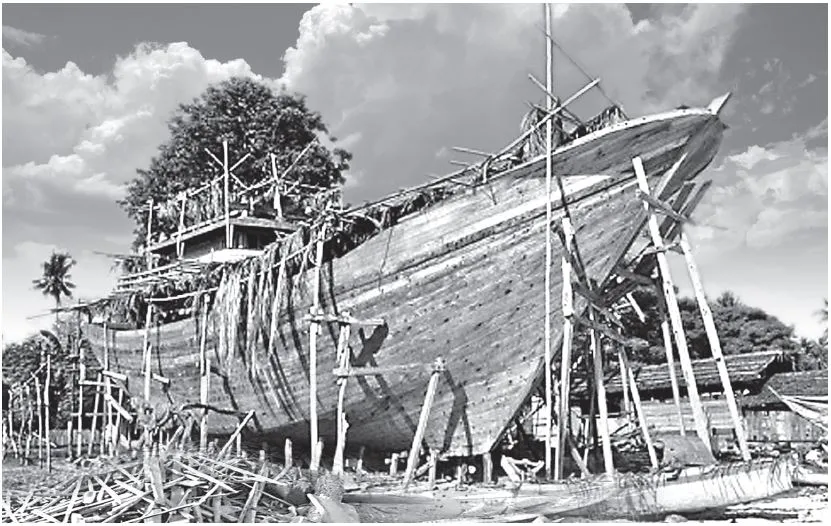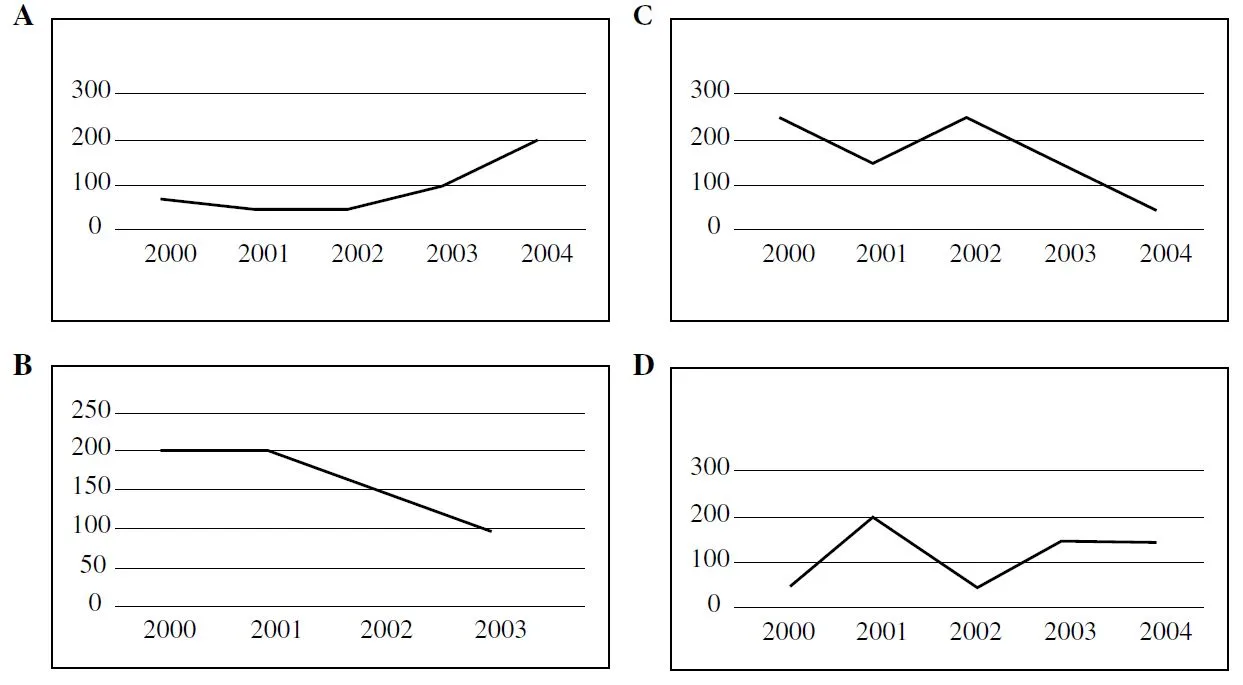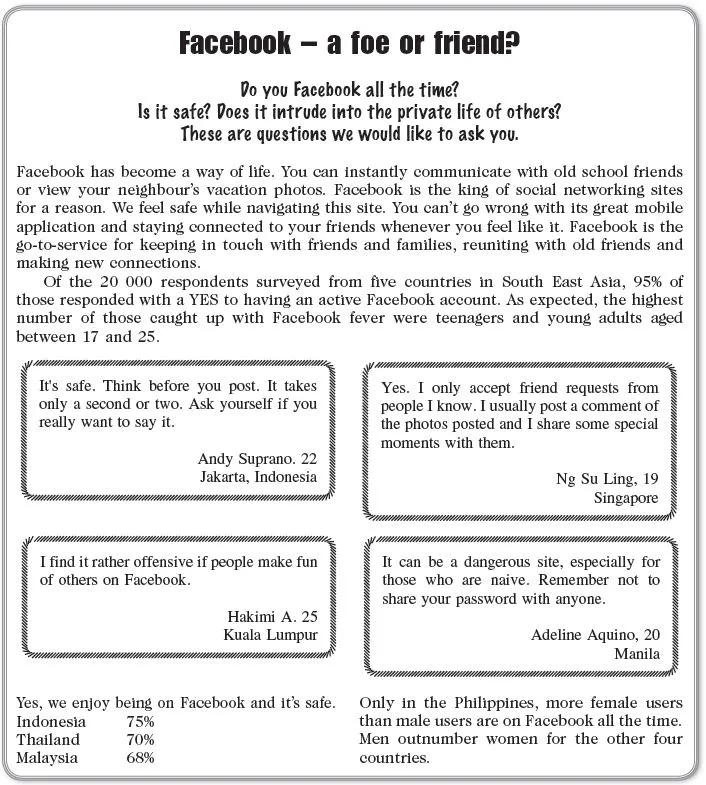KSSM Secondary Form 4 English Exercises Set 2
PAPER 2
This question paper consists of four sections: Section A, Section B, Section C and Section D.
Answer all the sections in this question paper. Questions in Section A have four options. Answer each question by choosing A, B, C or D on the question paper.
Section A
Questions 1 - 8 are based on the given stimuli. Study the information carefully and choose the best answser.
The Bloodhound SSC or supersonic car is the vehicle that will smash not only the current land speed
record, but also the air speed record by exceeding 1,000 miles per hour (1,600 km/h).
So how do you create something that can reach these remarkable speeds? In this interview screened
for the first time, Mark Chapman, chief engineer of the Bloodhound project reveals what it takes to create
such a machine. Tune in to find out why it needs three engines, and the key problem that took 18 months to solve.
A book C dog show
B flight D TV interview
Answer:
More than 100 of Malaysia’s most famous cartoonists, animators, comic illustrators and caricaturists were gathered at the launching ceremony of a new annual award for Outstanding Achievement in the field of Cartoon Creation. The award will be known as the ‘Kampung Boy Award’ held to commemorate the work of Mohammad Nor Khalid, Malaysia’s best known cartoonist, popularly known as ‘Lat’. The winner’s work is expected to embody the fun and laughter of living in multiracial Malaysia.
2 The Kampung Boy Award will be given on an annual basis to the person whoA reflects kampung life in his cartoons
B best creates the ‘balik kampung’ mood
C creates the greatest number of cartoons
D captures the spirit of a multiracial society
Answer:
Drones are flying robots. In the future, they may be
used in farming. They will be able to move GPS-guided
tractors and manage automated milking. Drones are
being used to survey crops. They will also help farmers manage the water and chemicals used in vast fields.
Chris Anderson, a famous science-fiction writer,
recently switched careers to move into the field of drone
manufacturing. He co-founded 3D Robotics, which is
currently building drones in Mexico and the United States. These beady-eyed drones may one day keep
watch over the food being grown for our consumption.
A Spies in the Sky C The Flying Farmhands of the Future
B Drone Invasion D The Use of Drones in Our Factories
Answer:
I was driving along the North-South highway from Ipoh to Kuala Lumpur when my car had a flat
tyre. I was really worried because at my age — I am 70 — It Is difficult to use the jack and unscrew
the bolts that secured the tyre. Nevertheless, I got started on the job. It was growing dark and it
had started to drizzle. My prayers were answered when an emergency help truck arrived.
“Uncle, let us help you,” said the two young men. The spare tyre was quickly fitted. I offered
the two men some money but they declined to accept it.
“It’s our duty,” they said and were on their way.
As a foreigner visiting Malaysia, I wish to applaud the warm hospitality I have been showered
with everywhere I have been in this lovely country.
Johannes Pataki
A hope C hospitality
B sincerity D appreciation
Answer:
The Bugis Seafarers
by Sofia Nasution

This documentary film tells of the history and seafaring exploits of the Bugis people
whose origins lie in the Moluccas islands of Indonesia. They are renowned for their ship-building skills as well as their navigation of the seas in Southeast Asia. In ancient times, the
Bugis were great fishermen and notorious pirates. Today the Bugis are a thriving business
community not only in the Moluccas but also in Malaysia, the Philippines and beyond.
A were popular C had a bad reputation
B were everywhere D had an easy time preying on seafarers
Answer:
The main threats to chimpanzees are habitat destruction, hunting and disease. The increasing human population is encroaching ever deeper into even protected areas of chimpanzee habitats, and large scale logging is now a major threat to the chimpanzees of Africa. Uncontrolled hunting of chimpanzees as a source of meat is another threat. Increased contact with humans, both local people and eco-tourists, has also brought on the threat of diseases which may be mild in humans but lethal to chimpanzees.
6 The word logging in the above text refers toA poaching of animals
B cultivation of crops
C cutting down trees for timber
D hunting of animals for their meat
Answer:
Sales Report
Sales of the new hybrid car named Super Zephyr have had mixed fortunes in the period 2000-2004. In the first year (2000),
we sold 40 units. Our peak year was 2001, when we made record sales of 200 units. In the following year,
our sales plunged to an all-time low of 30 units. Our sales recovered somewhat in 2003 when we managed to
sell 150 units. In 2004, our performance remained unchanged as for 2003.

Answer:
Jerantut: - 102 tourists were trapped at the Mutiara
Taman Negara Resort in Kuala Tahan when floods affected the surrounding areas.
Apart from
Malaysians, the tourists were from Germany, France,
Canada and the Czech Republic. The immediate problem they faced was a lack of food supply.
However, prompt action by the Fire and Rescue
Department saved the day. Four boatloads of food
supplies have been ferried to the tourists. Jerantut District Officer Ali Syahbana Sabaruddin said the
tourists were safe and would be transported by boat to relief centres in Kuala Tahan before being
flown by helicopter to Jerantut. The tourists were stranded after the water level at Sungai Tembeling
rose to 76.56 metres on Tuesday - way past the danger level of 68 metres.
BERNAMA
23 December 2014
A The tourists were all Malaysians.
B The food supplies were ferried by local villagers.
C The water level in Sungai Tembeling had risen above the danger level.
D The tourists would be taken by boat to Jerantut and flown to Kuala Tahan.
Answer:
Questions 9 - 15 are based on the following passage. Choose the best answer to fill in each blank.
Former international football player Dollah Don, nicknamed Harimau Malaya by the late Indonesian
president Soekarno, __9______ away at the age of 91 at the Puteri Specialist Hospital due to old
age. Soekarno had called Dollah Harimau Malaya after __10______ him score three goals against Indonesia’s famous
club named Persija FC in Jakarta in 1953.
Born Abdullah Mohd Don on March 23, 1923 in Stulang Laut, Johor Baru, Dollah was a gentleman on the field ___11____
off the field. He played football with a natural flair and was fearless in his nimble footwork and well-placed shots at goal time.
Many ____12___ remember Dollah Don describe him as a football legend. “He was an outstanding player in his heyday in the 1940s and 1950s,”
says Tan Joe Kim, aged 75, who was an ______13______ Dollah fan. He recalls that Dollah was a popular choice as a guest player for many teams.
Besides playing for Johor and Malaya, Dollah ______14_______ also featured for the Singapore and Perak teams.
Joe Kim further adds, “Dollah can be regarded ______15______ one of the greatest Malaysian sportsmen ever.” sportsmen ever.”
A pass
B passed
C passes
D passing
Answer:
10
A watch
B watched
C watches
D watching
Answer:
11
A. neither
B as well as
C rather than
D more than
Answer:
12
A that
B who
C which
D whom
Answer:
13
A ardent
B envious
C admired
D enviable
Answer:
14
A has
B had
C have
D having
Answer:
15
A in
B as
C with
D from
Answer:
Section B Questions 16 - 25
Read the following magazine article and complete the graphic organiser on the following page.

Questions 16 - 25
Using the information given, complete the graphic organiser below.
Survey:
— Topic of survey
16
— Number of countries involved in the survey
17
Benefits:
– A service that can help you
18
19
— reunite with old friends
Advice:
20 Accept
21 Think
Findings of Survey
— Do not share your password with anyone
22 make up the greatest number who are constantly on Facebook
Male users use Facebook more than females in the four countries surveyed except 23
24 that it is rude to mock others on Facebook
Indonesians and Thais surveyed said that they enjoy using 25
Section C
Questions 26 — 31 are based on the following passage.
1 After one night in Kuala Lumpur, we flew to Kuching to begin our quest which would
take us to the Batang Ai National Park — the only place in Sarawak where you get to see
wild orangutans. While you can pay RM1000 to go there on an organised tour, we wanted
to travel on our own. Being seasoned independent travellers, we felt that we would have
more time to enjoy our trip.
2 The first leg of our journey was a three-hour bus trip from Kuching to the small town
of Sri Aman. We were the only tourists there.
As we walked the streets looking for some
place to put up for the night, the locals waved and shouted greetings, some covertly taking
pictures of us as we passed. However, when we asked them about Batang Ai, they seemed
not to know much.
3 “No one goes there nowadays,” said our taxi driver, Mahat. “There is no bus service
to the place. The only helicopters that fly out belong to the police.”
4 We were dejected. We seemed to have reached a dead end. I sat on a roadside
pavement writing my diary entry about our unlucky day. Derrick walked ahead to the
riverine fishing village intending to take some photographs of the fishermen and their
boats. Twenty minutes later, Derrick returned with a piece of good news. “We’re in luck,”
announced Derrick. “I’ve found a boatman. He’s agreed to take us upriver by boat.”
5 The next morning, with Billy our Iban boatman at the prow, we began our trip upriver.
The boat meandered with the river past lush green jungles, with occasional longhouses on
the river bank. After a two-hour trip, Billy guided the boat to a wharf. He pointed to the
posh, pricey Batang Ai Resort Hotel.
6 “No, Billy,” said Derrick, gesticulating wildly with his hands and head. “We want to
stay in a longhouse.” Billy was at a loss. He was himself a stranger to Batang Ai. He did
not know the local folk. Again Derrick found the answer. He managed to talk to some
waiters at the resort. One of them, named Antalai, agreed to take us to the longhouse
belonging to his family.
7 We paused hesitantly at the threshold of the longhouse feeling like total intruders.
Led by Antalai and Billy, we walked ahead into the open communal living space which
runs the entire length of the longhouse; on the left side doors led off to separate sleeping
quarters. Skinny dogs lay all around; a group of women with toddlers and babies sat on
straw mats on the floor, laughing and talking while old women dressed in long sarongs
and men in shorts sat alone or in pairs.
8 That evening, the longhouse headman and his wife served us a dinner of simple
traditional [ban food; fish with pickled cucumber, rice, pumpkin and sausage washed down
with a glass of surprisingly strong rice-wine, which the Chief’s wife makes by hand. After
a freezing shower, we settled down with the other residents in front of the communal
television supplied by the government as part of a programme to ensure rural communities
received news from other parts of the country. As coffee was passed around and we tuned
in to a Malaysian soap series, I marvelled at how totally different but how strangely similar
it all was to life back in England.
9 We awoke to the smell of wood fire and the deafening crows of roosters early the
next morning. Antalai was all business today and we bid farewell to the Chief, boarding
the boat again for the two-hour journey to the National Park. To begin with, the boat cut
smoothly through the water, then abruptly we rounded a corner and came to a stop; the
entire stretch of the river was covered in floating logs and driftwood. We made our way
painstakingly through; Antalai and Billy used oars and feet to create a path as we lurched
from side-to-side. Derrick and I gripped the edges of the boat as if our lives depended on
it. At last, with the engine gunning, we were through and facing the next stretch of river,
which was even more difficult to negotiate. We were battered by water as we fought against
rapids, the bottom of the boat often scraping the riverbed or knocking into rocks — now
we understood why we needed two guides to make the journey.
10 The river eventually evened out and we pulled to a stop outside what looked like
several large huts on a hill. This, we thought, must be a ranger’s office where we would be
able to hire a trekking guide and arrange accommodation for the night.
As we approached,
however, we realised that the place was utterly deserted. The buildings were long ago abandoned
and had fallen into disrepair; we searched the eerie huts only to find that the jungle had
begun to claim them back; birds roosted in the ceilings, damp stained the floors and insects
crawled over the yellowing posters on the walls.
11 This was not what we had expected. We learned, much to our disappointment, that
orang-utans could no longer be seen at
Batang
Ai owing to deforestation activities. The
primates had now retreated deeper into the interior!
27 From paragraph 2,
(a) why did the tourists like the local people in Sri Aman?
(b) why were they disappointed in Sri
Aman?
28 (a) From paragraph 4, which word means ‘in low spirits’?
(b) From paragraphs 5 - 6, suggest two reasons why Derrick and the writer did not want to stay at the resort.
29 (a) From paragraph 7, quote the words that tell us the visitors felt like unwelcome guests.
(b) From paragraph 8, explain why the television is described as ‘communal’.
30 “The primates had now retreated deeper into the interior.’
Based on the statement above, how would you describe the orang-utans’ attitude to man’s activities?
Give a reason to support your answer.
Attitude:
Reason:
Section D
31 Read the poem below and answer the questions that follow.
Tha Charge of the Light Brigade
Half a league, half a league,
Half a league onward,
All in the valley of Death
Rode the six hundred
"Forward, the Light Brigade!
Charge for the guns!" he said:
Into the valley of Death
Rode the six hundred.
"Forward, the Light Brigade!"
Was there a man dismayed?
Not though the soldier knew
Some one had blundered:
Theirs not to make reply,
Theirs not to reason why,
Theirs but to do and die:
Into the valley of Death
Rode the six hundred.
Cannon to right of them,
Cannon to left of them,
Cannon in front of them
Volleyed and thundered;
Stormed at with shot and shell,
Boldly they rode and well,
Into the jaws of Death,
Into the mouth of Hell
Rode the six hundred.
Alfred, Lord Tennyson
(b) From stanza 3, quote the line that tells us that cannon balls were flying loudly all around the soldiers.
(c) Why do you think they continued to ride ‘boldly’ and ‘well’ despite the dangers?
(d) The poem highlights the sacrifices soldiers make in war. Identify one consequence of war. Show how this causes suffering.
Consequence:
Suffering:
If anyone has anything to discuss regarding to the kindly please comment in the facebook page
here.
如有需要讨论任何题目或有什么要基于改进的留言可到
面书上 留言。
More Free Exercises:
Form 1 ExercisesEnglish Exercises
Latihan Bahasa Melayu
Latihan Matematik
Latihan Sejarah
Latihan Geografi
Latihan Sains
Form 2 Exercises
English Exercises
Latihan Bahasa Melayu
Latihan Matematik
Latihan Sejarah
Latihan Geografi
Latihan Sains
Form 3 Exercises
English Exercises
Latihan Bahasa Melayu
Latihan Matematik
Latihan Sejarah
Latihan Geografi
Latihan Sains
Form 4 Exercises
English Exercises
Latihan Bahasa Melayu
Latihan Matematik
Latihan Sejarah
Latihan Biologi
Latihan Kimia
Latihan Fizik
Form 5 Exercises
English Exercises
Latihan Bahasa Melayu
Latihan Matematik
Latihan Sejarah
Latihan Biologi
Latihan Kimia
Latihan Fizik